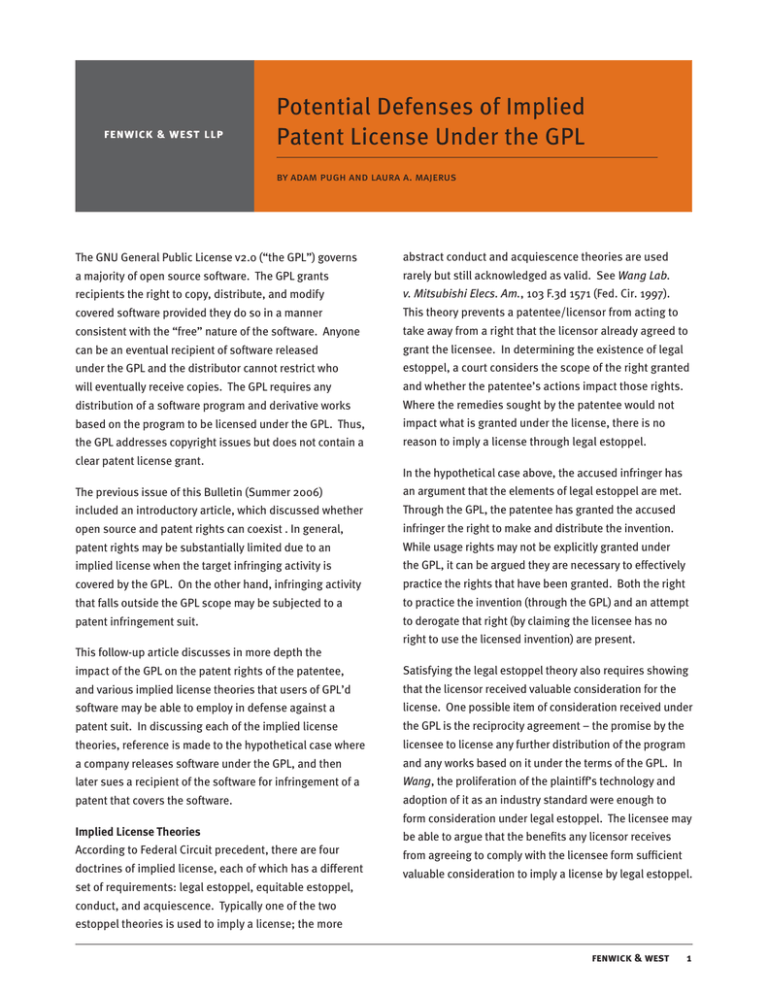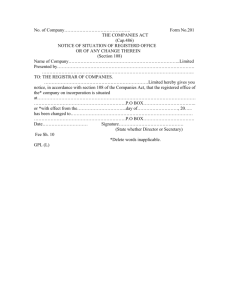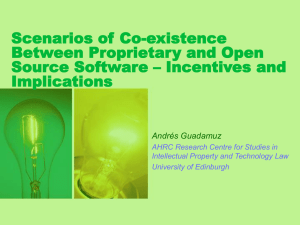
Potential Defenses of Implied
Patent License Under the GPL
by adam pugh and laura a. majerus
The GNU General Public License v2.0 (“the GPL”) governs
abstract conduct and acquiescence theories are used
a majority of open source software. The GPL grants
rarely but still acknowledged as valid. See Wang Lab.
recipients the right to copy, distribute, and modify
v. Mitsubishi Elecs. Am., 103 F.3d 1571 (Fed. Cir. 1997).
covered software provided they do so in a manner
This theory prevents a patentee/licensor from acting to
consistent with the “free” nature of the software. Anyone
take away from a right that the licensor already agreed to
can be an eventual recipient of software released
grant the licensee. In determining the existence of legal
under the GPL and the distributor cannot restrict who
estoppel, a court considers the scope of the right granted
will eventually receive copies. The GPL requires any
and whether the patentee’s actions impact those rights.
distribution of a software program and derivative works
Where the remedies sought by the patentee would not
based on the program to be licensed under the GPL. Thus,
impact what is granted under the license, there is no
the GPL addresses copyright issues but does not contain a
reason to imply a license through legal estoppel.
clear patent license grant.
In the hypothetical case above, the accused infringer has
The previous issue of this Bulletin (Summer 2006)
an argument that the elements of legal estoppel are met.
included an introductory article, which discussed whether
Through the GPL, the patentee has granted the accused
open source and patent rights can coexist . In general,
infringer the right to make and distribute the invention.
patent rights may be substantially limited due to an
While usage rights may not be explicitly granted under
implied license when the target infringing activity is
the GPL, it can be argued they are necessary to effectively
covered by the GPL. On the other hand, infringing activity
practice the rights that have been granted. Both the right
that falls outside the GPL scope may be subjected to a
to practice the invention (through the GPL) and an attempt
patent infringement suit.
to derogate that right (by claiming the licensee has no
This follow-up article discusses in more depth the
right to use the licensed invention) are present.
impact of the GPL on the patent rights of the patentee,
Satisfying the legal estoppel theory also requires showing
and various implied license theories that users of GPL’d
that the licensor received valuable consideration for the
software may be able to employ in defense against a
license. One possible item of consideration received under
patent suit. In discussing each of the implied license
the GPL is the reciprocity agreement – the promise by the
theories, reference is made to the hypothetical case where
licensee to license any further distribution of the program
a company releases software under the GPL, and then
and any works based on it under the terms of the GPL. In
later sues a recipient of the software for infringement of a
Wang, the proliferation of the plaintiff’s technology and
patent that covers the software.
adoption of it as an industry standard were enough to
Implied License Theories
According to Federal Circuit precedent, there are four
doctrines of implied license, each of which has a different
set of requirements: legal estoppel, equitable estoppel,
form consideration under legal estoppel. The licensee may
be able to argue that the benefits any licensor receives
from agreeing to comply with the licensee form sufficient
valuable consideration to imply a license by legal estoppel.
conduct, and acquiescence. Typically one of the two
estoppel theories is used to imply a license; the more
fenwick & west Equitable estoppel uses a very different theory to arrive at
It is also possible that a later modified version of the
an implied patent license. This defense involves finding
program might actually embody the invention of a
a reasonable inference by the licensee based on the
different patent held by the distributor. This forms a more
licensor’s conduct. Equitable estoppel requires that the
difficult scenario, because the GPL v2.0 puts no inherent
patentee communicate to the accused infringer in some
limits on what modifications can be made to the licensed
manner its intent not to sue, that the infringer rely on this
program. Later derivative works may function very
communication, and that allowing the patentee to proceed
differently from the original program that the company
with its claim would materially prejudice the alleged
released and licensed. A modification may embody
infringer. As with the other implied license doctrines,
patents that the company never intended to allow to be
fairness and factual details factor heavily into the finding.
used freely.
The accused infringer in the hypothetical case above could
Where a company sues on a patent embodied in the
argue that the patentee’s distribution of the software
changes of a derivative work, the arguments to imply a
under the GPL was the conduct that communicated
license may be less persuasive. In particular, each theory
intent not to sue; it would be reasonable for a user to
of implied license requires conduct by the licensor that
infer that a product released under the GPL can be used
indicates an intention not to enforce the patent. Such
without further permission from the author. In choosing
requisite conduct does not seem present for a patent
to download and run the program, the accused infringer
covering software not included in the patentee’s GPL
relied on the fact that it was released under the GPL. The
release. Both of the estoppel doctrines have additional
licensee should also have little difficulty showing material
requirements that make their application to this example
prejudice. While the typical situation invoking this
considerably weaker.
doctrine involves a much more direct relationship between
the parties, the facts of this hypothetical case would most
likely allow a court to imply a license under the asserted
patent.
In more detail, legal estoppel requires that the patentee
attempt to derogate from a granted right. Arguably,
however, the right that the patentee granted to modify
the program did not extend so far as to cover other
Even if the court accepts neither of the above estoppel
patents, and courts have declined to extend analogous
arguments as a basis for an implied patent license, the
doctrines (such as first sale doctrine) to modifications
patentee’s decision to release software under the GPL,
that infringe separate patents not covered by the
allowing people to download and use that software
unaltered invention. Despite the right granted under
without protest, might support an implied license based
the GPL, it is possible that legal estoppel will not protect
on conduct or acquiescence. It is well within the legal
this additional conduct. Note that some drafts of the GPL
framework of the implied license doctrine to make such a
v3.0, which has not been finalized when this article was
judgment if equity so requires.
written, expressly state that the licensor grants a patent
Implied License for Modified GPL Software
The GPL permits licensees to do more than just copy
right in patents covered by certain types of future-made
derivative works.
and distribute the program; it allows them to modify
Similarly, equitable estoppel requires reliance on
it and to then release those modifications under the
communication made by the patentee to the accused
GPL. If the modified versions violate the patent noted
infringer. Thus, protection of a program modification
in the hypothetical case above, the same implied
would require knowledge by the accused infringer
license arguments may protect the modifiers and any
(modifier) that the modifications infringed the patent of
downstream users. A modified version of the program
an upstream patentee, and belief by the modifier that the
that embodies the same invention as the original version
GPL reflected the patentee’s intent not to enforce that
clearly falls within the rights licensed by the GPL.
patent against a modified version of the program. It is
assumed that such factual findings would rarely occur or
be provable.
potential defenses of implied patent license under the gpl
fenwick & west
In short, the conduct of releasing software under the GPL,
while implying permission from the patentee to use this
specific software and alter or improve the software in
customary ways, does not necessarily imply permission
to add to the software other separate inventions patented
by the patentee. Specifically, given the language of the
current GPLv2.0, it is certain that a modified version of
software that infringes patents covering other inventions
not released under GPL by the patentee will not provide
its users with the same implied license defenses likely
accessible to those who only practice inventions available
in the original software released under GPL by the
patentee.
Broad Judicial Discretion
The existence of an implied patent license is a question
of law, and an implied license is an equitable defense
to patent infringement. A court considers the totality of
the relevant circumstances in determining whether an
implied license is warranted, and the specific facts-inquestion and fairness considerations are always relevant
to the court’s decision.
Because the GPL is different from licenses normally
available to business entities under patent law, and the
applicable equitable doctrines are under broad judicial
discretion, the courts may ultimately dispense with GPL
issues in a manner different than as discussed herein.
But from available case law, it is reasonable to conclude
that the implied license defense is available and tenable
for a defendant in a patent suit involving software
released under the GPL.
For further information, please contact Laura A. Majerus,
Intellectual Property Group, at 650.335.7152 (lmajerus@
fenwick.com).
this update is intended by fenwick & west llp to
summarize recent developments in the law. it is not
intended, and should not be regarded, as legal advice.
readers who have particular questions about these
issues should seek advice of counsel.
© 2006 Fenwick & West LLP. All Rights Reserved.
potential defenses of implied patent license under the gpl
fenwick & west


